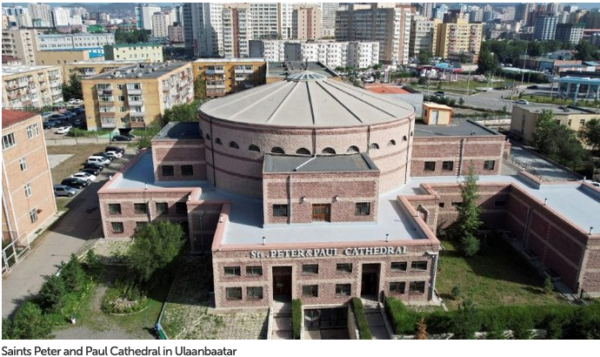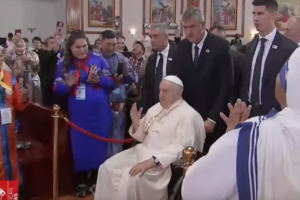Vatican News—A political analyst engaged in helping Mongolia implement democracy and human rights shines a light on the current socio-political challenges in the country, and upholds its commitment to protect freedom of religion and the rights of religious minorities.
Pope Francis’ historic Apostolic Visit to Mongolia would have been unimaginable during Mongolia’s communist period “where it was essentially a satellite of the then Soviet Union,” during which the regime clamped down on religious representatives and institutions and destroyed places of worship.
As Craig Castagna explained during an interview with Vatican News, when Mongolia adopted a new democratic constitution at the beginning of the 1990s, it guaranteed fundamental freedom of association and religion.
At a time, such as this, the Program Director for the International Republican Institute (IRI) in Mongolia, said, “it’s an opportunity to remind ourselves of the importance of religious tolerance and for Mongolia to stick to and follow through on its commitments to freedom of religion and protection of the rights of minority populations, especially religious minorities, and to live up to these cornerstone democratic values that serve as a positive example in these areas.”
Speaking as the country prepares to welcome Pope Francis, the first Pope to set foot on Mongolian soil, Mr. Castagna shed light on a country he described as “pretty unique” in terms of history and culture and politics, and its status today, 30 years since its democratic transition, is marked by both successes and failures.
“Overall Mongolia’s transition to democracy has been incredibly successful,” Mr. Castagna noted, pointing out that Mongolian citizens are freer, they have more opportunity, they have a better quality of life that’s improved over the years, and the country has developed a lot in terms of economics.
“One of the main challenges has been corruption which has served as a major drag on the country’s economy, and for sure has sucked away opportunity for people,” he said, noting that young Mongolians are voicing their anger over this and “simply expect better.”
Mongolia, Mr. Castagna explained, is a large country geographically – roughly the size of Western Europe or the state of Alaska in the United States – and it has a small population, (just under 3.5 million), but it’s rich in resources, “So in theory, it should be a wealthier, more prosperous place.”
From a political point of view, he added, the democratic process is successful, with multiple peaceful handovers of government over the last three decades.
Geo-political position and challenges
Mongolia is located in a unique geographical position between Russia and China, and Mr. Castagna affirmed that it maintains what appear as a tricky economic and cultural independence by keeping up good relations with both its neighbor to the north – Russia – and its neighbor to the south – China.
“Both are much larger countries, much larger populations and economies, so it’s a very tight balance,” he said, “But Mongolia also has what’s called a third-neighbor foreign policy.”
That means, he explained, that it also diversifies and optimizes relations with so-called third-neighbor countries “such as the United States as a key third neighbor, Canada, the European Union, South Korea, Japan and even India.”
Australia has become a third neighbour in recent years, and it’s one of those bigger destinations in terms of Mongolians going abroad.
In fact, Mr. Castagna continued, one challenge the government is facing is how to stop “a sort of brain drain that is happening and has been happening for some time now,” so there is a “lot of talk about expanding economic opportunities for young Mongolians.”
The government, he reiterated, is really trying to grapple with the consistent frustration expressed by young Mongolians and their interest in going abroad.
And, you know, I think there has been a little bit of a spotty record in terms of just what we were seeing, because you haven’t really seen a stoppage, so to speak, of the brain drain.
“There’s still a lot of interest in young Mongolians to go abroad,” he said.
Freedom of religion
The country Pope Francis is visiting is one where just over half the population is Buddhist, but where freedom of religion is enshrined in the Constitution.
“It would be important for the Pope to bring attention to the importance of freedom of religion and also inter-religious dialogue and tolerance overall” with his presence, Craig Castagna said.
He recalled that due to Mongolia’s communist past “where there was an absence of freedom of religion and freedom of conscience for almost seven decades, there is a significant segment of the population today in Mongolia who do not affiliate at all with any religion.”
This, he said, has resulted in the fact that a significant segment of the population does not profess any religion at all, but “since Mongolia’s 1990 democratic revolution, there has been a growth of religious institutions” and a resurgence of religious practice.
Mr. Castagna pointed to the recent appointment of the Apostolic Prefect of Ulaanbaatar, Giorgio Marengo, to the rank of Cardinal and said, this too speaks to the fact that although the Catholic following is tiny, Mongolia’s is an open society where Christians are welcome.
A place of potential and opportunity
Regarding his own feelings and hopes about his adopted homeland, where he has been working for IRI in Mongolia for the last five years, implementing democracy and governance programs and supporting democratic development, prior to which he arrived in the country as a United States Peace Corps volunteer, Mr. Castagna voiced his conviction that “despite its challenges and struggles, it’s a place of great potential and opportunity.”
“Mongolia has really come a long way in the last 30 years of transition, and my hope is that it continues to develop and strengthen its democracy so that freedom and opportunity can be available to all who live here,” he said.
Pope’s visit a milestone
Finally, regarding his thoughts about the visit of Pope Francis, Mr. Castagna described it as a “milestone, both for Mongolia and for the Catholic Church.”
The visit, he added, is notable in that it constitutes the first papal visit to Mongolia, a Buddhist majority country.
“That sends a big message of inclusivity, outreach on behalf of the Catholic Church, and outreach even in places where you could say it’s a little unexpected,” he said.
On the Mongolian side, Mr. Castagna added, “the visit underscores the fact that Mongolia is not just a small, isolated country sandwiched between Russia and China, but it’s a part of a larger, diverse global community, and that has been allowed to happen because of Mongolian democracy.”

Such a visit, he explained, would have been unimaginable during Mongolia’s communist period where it was essentially a satellite of the then Soviet Union.
“And Mongolia itself had experienced its own very real history with authoritarianism through the communist-led religious purges during the late 1930s, which resulted in – they estimated – about 20, 000 executed Buddhist monks and the shutting down of every monastery in the country almost.”
Just over 30 years ago, the country’s democratic transition allowed it to adopt a new democratic Constitution that guarantees freedom of association and religion.
“So basically, just to sum it up, I think Pope Francis’s visit is a testament to Mongolia’s openness to the world,” he said, “And at the same time, it’s an opportunity to remind ourselves of the importance of religious tolerance”, and to encourage Mongolia “to stick to and follow through on its commitments to freedom of religion and protection of the rights of minority populations, especially religious minorities.






You must be logged in to post a comment.